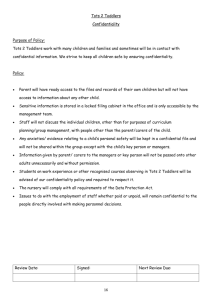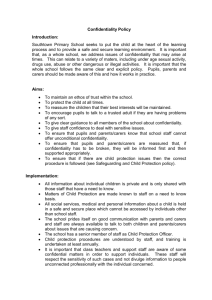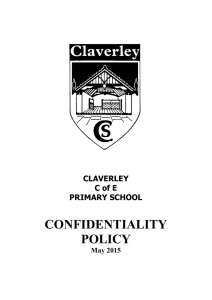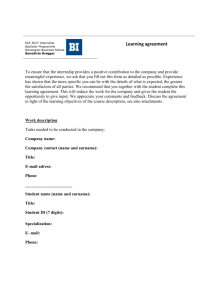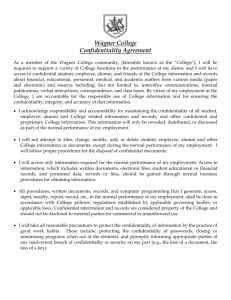Confidentiality Policy - Clitheroe Royal Grammar School
advertisement
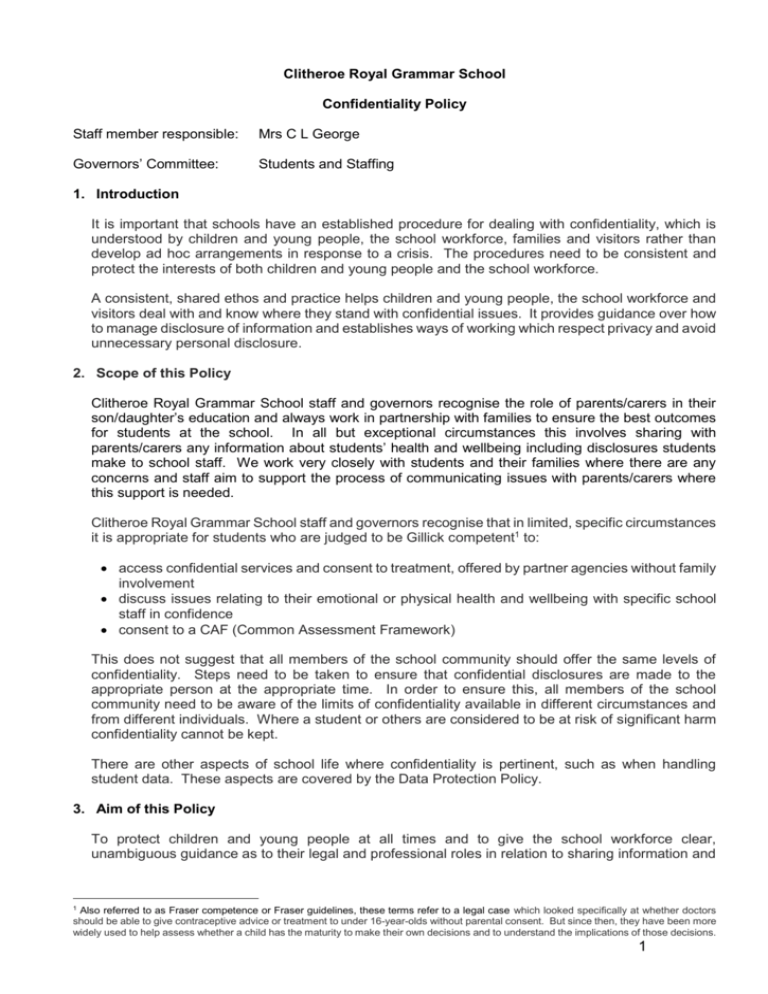
Clitheroe Royal Grammar School Confidentiality Policy Staff member responsible: Mrs C L George Governors’ Committee: Students and Staffing 1. Introduction It is important that schools have an established procedure for dealing with confidentiality, which is understood by children and young people, the school workforce, families and visitors rather than develop ad hoc arrangements in response to a crisis. The procedures need to be consistent and protect the interests of both children and young people and the school workforce. A consistent, shared ethos and practice helps children and young people, the school workforce and visitors deal with and know where they stand with confidential issues. It provides guidance over how to manage disclosure of information and establishes ways of working which respect privacy and avoid unnecessary personal disclosure. 2. Scope of this Policy Clitheroe Royal Grammar School staff and governors recognise the role of parents/carers in their son/daughter’s education and always work in partnership with families to ensure the best outcomes for students at the school. In all but exceptional circumstances this involves sharing with parents/carers any information about students’ health and wellbeing including disclosures students make to school staff. We work very closely with students and their families where there are any concerns and staff aim to support the process of communicating issues with parents/carers where this support is needed. Clitheroe Royal Grammar School staff and governors recognise that in limited, specific circumstances it is appropriate for students who are judged to be Gillick competent1 to: access confidential services and consent to treatment, offered by partner agencies without family involvement discuss issues relating to their emotional or physical health and wellbeing with specific school staff in confidence consent to a CAF (Common Assessment Framework) This does not suggest that all members of the school community should offer the same levels of confidentiality. Steps need to be taken to ensure that confidential disclosures are made to the appropriate person at the appropriate time. In order to ensure this, all members of the school community need to be aware of the limits of confidentiality available in different circumstances and from different individuals. Where a student or others are considered to be at risk of significant harm confidentiality cannot be kept. There are other aspects of school life where confidentiality is pertinent, such as when handling student data. These aspects are covered by the Data Protection Policy. 3. Aim of this Policy To protect children and young people at all times and to give the school workforce clear, unambiguous guidance as to their legal and professional roles in relation to sharing information and 1 Also referred to as Fraser competence or Fraser guidelines, these terms refer to a legal case which looked specifically at whether doctors should be able to give contraceptive advice or treatment to under 16-year-olds without parental consent. But since then, they have been more widely used to help assess whether a child has the maturity to make their own decisions and to understand the implications of those decisions. 1 confidentiality, ensuring good practice throughout the school which is understood by the whole school community including families. 4. Rationale The policy seeks to implement the underlying principles of the Every Child Matters Agenda and to address the issues which may arise about sharing information and confidentiality Clitheroe Royal Grammar School is committed to developing creative and positive ways for the student voice to be heard whilst recognising the responsibility to use, hold and safeguard information received. Sharing information unnecessarily is an erosion of trust The UN Convention on the Rights of the Child supports the view that children and young people should be entitled to confidential support alongside safeguarding them from harm Clitheroe Royal Grammar School, in line with national guidance, recognises the importance of children and young people having access to confidential services, including health services to support their physical and emotional needs The staff and governors of Clitheroe Royal Grammar School are mindful that they are placed in a position of trust by all stakeholders and there is a general expectation that a professional approach will be used in all matters of information sharing and confidentiality Families, children, young people and other adults should all expect that information they identify as confidential will not be shared with any other party unless it is a safeguarding issue, in which case the appropriate member of the school workforce will be consulted or permission will have been given as part of the CAF process 5. Limitations of Confidentiality When speaking confidentially to someone the confider has the belief that the confidant will not discuss the content of the conversation with another. The confider is asking for the content of the conversation to be kept secret. Anyone offering absolute confidentiality to someone else would be offering to keep the content of his or her conversation completely secret and discuss it with no-one. In practice there are few situations where absolute confidentiality is offered at Clitheroe Royal Grammar School. Our goal is to strike a balance between ensuring the safety, wellbeing and protection of our students, whilst engendering an ethos where they are confident in accessing help and information when required. Personal disclosures, however, will be treated with due sensitivity and privacy. This means that in most cases what is on offer is limited confidentiality. The general rule is that staff should make it clear that there are limits to confidentiality, at the beginning of the conversation. These limits relate to ensuring children’s safety and wellbeing. Staff could use the following or a similar quote at the start of their conversation: “I cannot promise complete confidentiality because if you are at risk, I may need to share what you tell me with others in order to protect you.” 6. Sharing Information with Parents / Carers School staff will always encourage students to discuss any concerns that they may have about their health or wellbeing with parents/carers. Staff recognise that the responsibility for the welfare of students rests with parents/carers and it is important wherever possible to support students in communicating with parents/carers about any issues that may be affecting them. While recognising the importance of sharing information with parents/carers, it may take a period of time for students to feel ready or able to talk to their parents/carers. In order to support this process school staff may maintain the confidence of students where all of the criteria set out below apply: The student has refused to consent to the information being shared with parents or carers Support for the student to share this information themselves with parents/carers has been offered and refused 2 The student is not judged to be at risk of immediate or significant harm (see Child Protection policy) The student is judged to be ‘Gillick competent’ under Fraser guidelines The Head of the Main School or Head of the Sixth Form has been fully informed about the nature of any disclosure made The Headteacher has been informed of the extent and limitations of confidentiality offered There may be circumstances in which breaking the confidentiality of a student may place them at greater risk or may prevent them accessing necessary treatment, without which their physical or emotional health would be adversely affected. In these circumstances a student who meets the criteria set out above will have their confidence maintained. Any decision to protect the confidentiality of a student is taken only by the Head of Main School or the Head of Sixth Form in consultation with other experienced professionals as relevant to the circumstances. Decisions relating to confidentiality are recorded and stored in students’ files (see Appendix B). 7. Student Confidentiality Students are entitled to expect personal information to remain confidential. This means that their personal information should not be disclosed to anyone including the child’s parents/carers unless, having considered all the circumstances, it is considered necessary for one of the following reasons: In the interest of health and safety of the child Where a child is not considered to be ‘Gillick competent’ For the prevention or detection of crime Even then care must be taken to limit disclosure to only those who ‘need to know’. Judgements on Gillick competence are made on an individual basis taking into account the students’ maturity, their understanding of the circumstances and any personal factors that affect their competence to make a decision, for example Special Educational Needs (SEN) or involvement of outside agencies. In general, students over the age of 13 are judged to be Gillick competent (see Appendix A). Confidentiality is a whole-school issue which relates to all staff and students including voluntary staff who must be fully aware of the requirements of the policy. Where a decision has been made to disclose information related to a student this discussion must be conducted privately and not in a public area of school where sensitive information can be overheard by others. 8. Access to Health Care and Counselling Clitheroe Royal Grammar School staff and governors have a strong commitment to promoting and protecting the physical and emotional health and wellbeing of students. We aim to ensure that students develop awareness of how to protect their health and know how to seek early advice and support if needed. Where there are concerns about the physical or emotional health and wellbeing of individual students a range of strategies are used to intervene early and support students. Staff work closely with external agencies where required including with East Lancashire Child and Adolescent Service (ELCAS) or other Child and Adolescent Mental Health Services (CAMHS). Staff also encourage students to access the support available within school from the School Nurse and the School Counsellor. Students may access the services of the School Nurse and School Counsellor without the consent of parents/carers. The School Nurse and School Counsellor judge the competence of the student to consent to treatment without parental consent as healthcare professionals using Fraser 3 guidelines. The School Nurse and the School Counsellor pass on any concerns with respect to Child Protection and Safeguarding issues to Designated Senior Persons (DSPs) who make a judgement on the need to involve parents/carers and other agencies. The School Nurse and the School Counsellor both encourage students to seek the support of their parent and carers, whilst respecting the need to protect students’ confidentiality. 9. Confidentiality in the Classroom Confidentiality must be discussed in Personal, Social and Health Education (PSHE) lessons and in any learning context where students are asked to disclose sensitive personal information. At the start of the academic year, new topic or key lesson, as appropriate, ground rules relating to confidentiality must be highlighted and agreed. For example: We won’t ask each other any personal questions We will respect each other and not laugh or try to hurt someone’s feelings Challenge the statement but not the person Listen carefully to the ideas of others We won’t say anything which we want to keep confidential (keep stories anonymous or discuss scenarios) We can opt out if we feel uncomfortable We won’t talk about other peoples’ comments outside of the lesson If we are worried about someone else’s safety we will tell the teacher 10. Sexual Health Teaching staff may discuss general issues related to contraception and sexual health in the context of Sex and Relationships Education lessons. They should not give individual advice with regard to contraception or treatment but instead should signpost the student to the relevant sources of advice and support including the School Nurse and their GP. In the context of Sex and Relationships Education students may be informed about other sexual health advice and treatment services including CaSH (Contraceptive and Sexual Health) clinics. School staff are not legally obliged to inform anyone if they learn or suspect sexual activity in students under the age of 16, if there is no evidence of abuse or exploitation. Staff should, however, encourage students to talk with a parent or carer and signpost them to sexual health advice and treatment services. School staff should make the DSP aware. School staff should not accompany students to sexual health consultations. If a student under the age of 13 is believed to be sexually active, this should be reported immediately to the school’s DSP. At both sites, the school currently offers signposting to the following confidential services (i.e. without parental/carer consent) to students judged “competent to consent” under the Fraser Guidelines: Counselling with the school counsellor Dawn Crossley Referral to the School Nurse drop-in service The following services are offered to Sixth Form students and may be offered in rare circumstances to students at Main School: Pregnancy testing (through the “Nurse in a Box” programme or referral to School Nurse) Chlamydia screening (through the NHS “best to know” programme) Signposting in confidence to other agencies (for example drug/alcohol dependency services or early intervention) Date of last review: Date of approval by the Governing Body: Date for review: September 2015 September 2015 September 2017 4 Appendix A Applying Fraser Guidelines The following checklist provides some guidance for staff when they are required to make a decision about any of the above. They are meant to act as prompts for discussion rather than a list to be worked through. 1. Does the young person understand the information and advice I am providing? Are they listening to me? Are they talking to me? Have I explained clearly about the options to access services? Have I explored with the young person whether someone could accompany them to access services? Have I given them all the information and advice I think is relevant and necessary to the situation they have presented to me? Can they repeat back to me what I have said? Have they had any advice/information or services from elsewhere, how long ago and what have they remembered? Can they apply that information to the circumstances now? 2. The young person cannot be persuaded to tell his parents, or to allow school staff to tell them, but they are seeking appropriate advice to address the issues disclosed: What is the family situation of the young person, how do they describe their relationship with them? Consider whether the young person might face prejudice, discrimination or oppression from their parents/carers if they have discussed the issue with them. Perhaps chat about other issues that have been difficult to discuss with parents/carers, explore what happened then. Ask how the young person thinks the parents/carers might react to the situation. Explore if they might want help to talk to their parents/carers and who might help them do this? What does the young person want? 3. The young person is likely to begin or continue to have unprotected sex or misuse drugs with or without the provision of information and advice: Has the young person told you or implied that they are having/have had unprotected sex/misused drugs and will continue to do so? What reason have they given for not accessing services? 4. The young person’s physical or mental health is likely to suffer unless he/she receives information/advice and it is in the young person’s best interest to give information and advice: If you are clear that the young person is going to or will continue to have unprotected sex or misuse drugs, they are not accessing and will not access services then it is a reasonable judgement that their physical and/or mental health may suffer as a result. In supplying information, advice and support you are acting to protect their safety, possibly preventing a child from becoming pregnant and promoting their emotional wellbeing. A young person under the age of 13 is not considered to be competent to consent under Fraser guidelines. A young person aged 16 or over is considered competent. For students aged 13, 14 or 15 years a judgement will be made on an individual basis. 5 Aide Memoire Having considered the legal framework and broad, underpinning principles around confidentiality, the aide memoire below will assist staff in making safer, consistent judgements around what can be complex and contentious scenarios. Simplistically, the judgement that will need to be made centres around five key questions: 1. What is in this child’s or young person’s best interests? 2. Who needs to know? 3. What/how much do they need to know? 4. Why do they need to know? 5. When do they need to know? No promises to keep ‘Secrets’. 1. Clarify the Information What are the facts as you understand them? Don’t assume! Check! Rumours, hearsay, gossip: weight? status? source? Who else may have relevant information? Can/should you have access to this? Is there a CAF open? Is an early support plan needed? Who else has been told and what exactly have they been told? 2. Risk Assessment Does the information indicate that a child or young person is at risk? High, medium, low? Of what? (Child Protection, Health etc.?) Immediate? Medium/longer term? Alongside potential risks, what are the strengths and positives and how can these be used? Is there any immediate action I need to take? Is there anyone in particular that I need to notify? (i.e. Designated Safeguarding Person, Police, Health) Is there a CAF open? Is an early support plan needed? Have I made use of the Lancashire Continuum of Need and the pre-assessment checklist? 3. Role and Responsibilities Have I adhered to other relevant policies and procedures i.e. Drugs, Sex and Relationships Education, Child Protection, Anti-bullying etc? Break it down! What exactly is my role here? What is the immediate, presenting problem/issue? Could there be additional unmet need? Differentiate between your professional role and judgement(s) and any personal/’moral’ view you may have. 19 4. Advise and Support (for Staff) It’s OK to feel anxious or unsure. Who should you seek advice from? Internal sources External sources (who is best placed to seek this?) Be mindful of confidentiality issues when seeking advice i.e. do you need to name/identify the child or young person? 6 5. Records What must be recorded? Date(s) at every stage/event. Information received. Source(s) of information. Issues considered i.e. speaking to parents/carers, consent, competence. Procedures considered. Advice sought and offered - When? Who? What? Action taken. Any on-going monitoring/support plan. Records must be signed (Recorder, Senior Manager, Child or young person when relevant) and dated. Who takes overall responsibility for these records? Where, how and by whom will they be stored? What advice will be sought, by and from whom, in the event of a Freedom of Information request? If the child or young person or their parent / carer were reading what you are writing, what would they think? 7 Appendix B Confidentiality Competent to Consent Record Name of student: Date: Does the young person understand the information and advice I am providing? Comments: Can the young person be persuaded to tell his or her parents they are seeking health advice, information or services? Comments: Will the young person allow the member of staff or anyone else to tell parents/carers they are seeking health advice, information or services? Comments: Is the young person likely to take risks which may affect their health with or without the provision of information, advice or services? Comments: Is the young person’s physical or mental health likely to suffer unless he or she receives information, advice, or access to health/support services? Comments: Is it in the young person’s best interests to give information or advice or assistance to access health/support services? Comments: Any other relevant information? Needs met in house? Early Support Plan initiated? CAF initiated? Professional sign: Name/role: Date: Yes No Yes No Yes No Yes No Yes No Yes No Young person sign: Name: Date: 8 Confidentiality, Young People, Families and Schools – Information for Parents/Carers The Law! The appropriate sharing of information within school and, at times, with others is an essential element in ensuring the safety and wellbeing of children and young people. Will I be told everything that my child tells an adult in school? Can my child consent to any sort of health treatment or access services without my knowledge? As a matter of general principle, any personal information acquired in the course of working with children and families should be regarded as confidential. The safety, wellbeing and protection of children and young people are the paramount considerations in all decisions that the school workforce will make regarding the issue of confidentiality. The general principle is that the child’s confidentiality must be respected. So if a child discloses something to an adult and asks them to keep it confidential, the adult will do so. Generally, only if the young person is at significant risk (ie the child’s welfare must be safeguarded) is the need to keep the information confidential overridden and confidentiality will be broken. United Nations Convention on the Rights of the Child (UNCRC) endorses the view that children and young people should be entitled to confidential support alongside safeguarding them from harm. People working with young people will assess if a young person is ‘competent to consent’. If a young person is ‘competent’ the adult cannot inform their parents against their wishes. Generally, young people age 12 years and below cannot consent, 13 – 16 year olds will assessed on an individual basis, over 16s can consent. Be assured that at all times children and young people disclosing personal information to an adult will be encouraged to talk to their parent or carer. The adult in school will offer to help them to do this. 9
